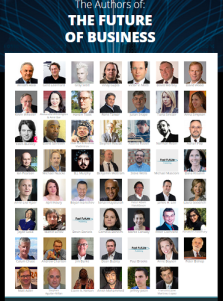Calum Chace's Blog, page 19
August 23, 2015
Creating an audio book – by recording artist Joe Hempel
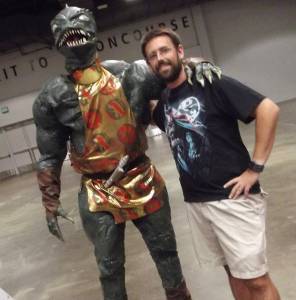 This is a guest post by the voice recording artist Joe Hempel – seen here with a dentist’s best client. Joe has done a great job of voicing Pandora’s Brain, which will shortly be available as an audio book, and he is currently hard at work on the audio version of Surviving AI.
This is a guest post by the voice recording artist Joe Hempel – seen here with a dentist’s best client. Joe has done a great job of voicing Pandora’s Brain, which will shortly be available as an audio book, and he is currently hard at work on the audio version of Surviving AI.
Joe is a diligent and talented recording artist, and it’s been a pleasure working with him. So I invited him to explain a bit about the process of recording an audio book.
—
When the audition for Pandora’s Brain popped up on ACX (Amazon’s audio creation exchange), I had to jump in. Books that pique my interest don’t come along very often: the world seems to be filled with sparkly vampires, glorified domestic abuse, and book 75 of series written by ghost authors. It’s rare that something as smart as Pandora’s Brain comes along, exploring a world that seems almost impossible but is actually not far off.
The challenge with any audio book is to make the characters come alive for the listener. Hopefully after you listen to the book, you will think I did my job well.
The creation of an audio book takes a surprising amount of time. It involves prepping the book, recording, editing, proofing checking, then sending to the author. If the author has any comments then these need to be incorporated and returned. All in all it takes around 5-6 hours for each hour you listen to.
Pandora’s Brain avoids getting bogged down with technical details. (You can get the whole AI story when Surviving AI, the non-fiction companion, comes out next month.) In the novel, Calum gives you just what you need to understand the context and then moves on to the action and the character development. The dialogue is crisp, and the action sequences are fast, action packed and hard-hitting! There are plenty of twists and turns along the way, and hopefully the audio version conveys the tension and the roller coaster of emotions that the characters go through.
Thought-provoking and exciting, Pandora’s Brain will stay etched in your brain and may prompt you – like me – to go looking for more information on the subject. It will make you think about your life, your mortality, and what truly makes you…..you!


August 12, 2015
Book review: The Patient Will See You Now, by Eric Topol
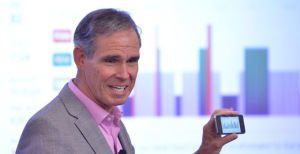 Eric Topol is a techno-optimist and a leading advocate of radical change in the medical profession. Judging by some of the reactions to this best-selling book, parts of that profession see him as a traitor.
Eric Topol is a techno-optimist and a leading advocate of radical change in the medical profession. Judging by some of the reactions to this best-selling book, parts of that profession see him as a traitor.
Smartphone revolution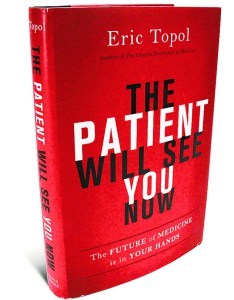 One of the two main themes in Topol’s latest book is that the AI embedded in our smartphones is about to spark a revolution in healthcare. Paired with tiny sensing devices and accessing ever-increasing amounts of data, smartphone apps enable patients to monitor every aspect of our bodies. Diagnoses can be made and prescriptions issued without us having to physically visit the doctor’s surgery, or set foot inside the perilous environments known as hospitals.
One of the two main themes in Topol’s latest book is that the AI embedded in our smartphones is about to spark a revolution in healthcare. Paired with tiny sensing devices and accessing ever-increasing amounts of data, smartphone apps enable patients to monitor every aspect of our bodies. Diagnoses can be made and prescriptions issued without us having to physically visit the doctor’s surgery, or set foot inside the perilous environments known as hospitals.
Medical paternalism
In other words, Topol is pointing out that the digital revolution which is sweeping across all industries and organisations will lead to big changes in healthcare too. This should probably be an uncontroversial observation, but of course healthcare is different from other industries. There are good reasons why it is conservative and heavily regulated, but Topol’s other big theme is that the healthcare profession is paternalistic and patronising. Doctors are convinced they always know best, and the rest of us are “patients” – people who must wait, rather than “customers” or “clients” who are actively involved in the management of our own health. Generally, we cannot even be trusted to see our own healthcare data, much less direct what is done with it. This attitude, Topol argues, started way back with Hippocrates, and today, he complains, MD stands for Medical Deity; instead of evidence-based medicine we have “eminence-based medicine”.
 In every other industry, technology drives down costs and consumers are considered perfectly capable of making decisions for themselves. But many doctors believe that medical information is uniquely hard for ordinary people to understand, and we will become stressed and harder to treat when (not if) we mis-interpret it.
In every other industry, technology drives down costs and consumers are considered perfectly capable of making decisions for themselves. But many doctors believe that medical information is uniquely hard for ordinary people to understand, and we will become stressed and harder to treat when (not if) we mis-interpret it.
Superior diagnosis
Topol is confident that in time, the clinicians’ resistance to the digital revolution will be swept aside because the benefits of the digital revolution are irresistible. For instance, he points to an impressive range of tests which can be taken with the assistance of smartphones:
 “There are now wearable wireless sensors, either commercially available or in clinical development, to capture physiologic data on a smartphone. This includes blood pressure, heart rhythm, respiratory rate, oxygen concentration in the blood, heart rate variability, cardiac output and stroke volume, galvanic skin response, body temperature, eye pressure, blood glucose, brain waves, intracranial pressure, muscle movements, and many other metrics. The microphone of the smartphone can be used to quantify components of lung function and analyze one’s voice to gauge mood or make the diagnosis of Parkinson’s disease or schizophrenia. One’s breath can be digitized to measure a large number of compounds, such as nitric oxide or organic chemicals … Testing saliva, there is the capability to detect strains of the influenza virus and strep throat.”
“There are now wearable wireless sensors, either commercially available or in clinical development, to capture physiologic data on a smartphone. This includes blood pressure, heart rhythm, respiratory rate, oxygen concentration in the blood, heart rate variability, cardiac output and stroke volume, galvanic skin response, body temperature, eye pressure, blood glucose, brain waves, intracranial pressure, muscle movements, and many other metrics. The microphone of the smartphone can be used to quantify components of lung function and analyze one’s voice to gauge mood or make the diagnosis of Parkinson’s disease or schizophrenia. One’s breath can be digitized to measure a large number of compounds, such as nitric oxide or organic chemicals … Testing saliva, there is the capability to detect strains of the influenza virus and strep throat.”
 Testing patients “in the wild”, as Topol puts it, and gathering data (“digital breadcrumbs”) over time, monitoring the impact of drugs, food, exercise, and stress is a better route to diagnosis and prescription than waiting around in the surgery (for an average of 62 minutes in the US, apparently) to get into the exam room and be seen by a doctor for a few minutes. Or rather, not be seen, because the doctor is busy looking at her keyboard to type information into the electronic medical record which we patients are not allowed to see.
Testing patients “in the wild”, as Topol puts it, and gathering data (“digital breadcrumbs”) over time, monitoring the impact of drugs, food, exercise, and stress is a better route to diagnosis and prescription than waiting around in the surgery (for an average of 62 minutes in the US, apparently) to get into the exam room and be seen by a doctor for a few minutes. Or rather, not be seen, because the doctor is busy looking at her keyboard to type information into the electronic medical record which we patients are not allowed to see.
Credibility and credit
Topol is carving out a niche for himself as the US’ foremost clinician-turned-revolutionary. He is a practicing cardiologist, and professor of genomics at La Jolla, California. His books have received plaudits from politicians and the media, but brickbats from many of his colleagues. This one is a little rambling and repetitive in places, but it is both authoritative and important.
TL;DR The go-to book on how AI will impact healthcare.
The go-to book on how AI will impact healthcare.


July 26, 2015
Humanity’s capacity to believe fiction is our super-power
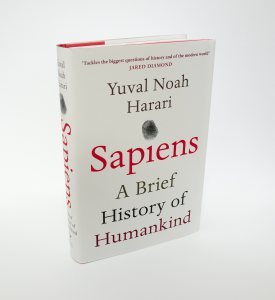 This may seem a bit off-topic, but bear with me.
This may seem a bit off-topic, but bear with me.
Yuval Harari’s book “Sapiens” is brilliant. I wish I’d written it. It’s stuffed full of great insights, large and small, and the writing style is crisp, clear and often witty. You can sample his thinking in this TED talk:
One of Harari’s most important insights is that the reason why humans rule the world, and why the fate of every other species depends on us, is our ability to believe things that aren’t true. Our ability to believe that money is valuable, and that nations and gods exist is what enables us to organise in flexible ways in large numbers. That in turn enables us to hunt and kill mammoths, and to build skyscrapers and zoos.
(Social insects organise in large numbers, but not flexibly. If their current mode of organisation suddenly becomes ineffective, they’re done for.)
So fiction is valuable to us. Perhaps that is why JK Rowling’s net worth is greater than the price Nikkei is paying for the FT.
And here’s the link to AI – a tenuous one, I admit. If the ability to believe things that aren’t true is such a vital component of humanity’s use of intelligence to rule the world, will it also be important to a superintelligence? Will the first superintelligence turn out to be the best novelist (or Haiku writer) that the world has ever known?


July 16, 2015
Endorsements for “Surviving AI”
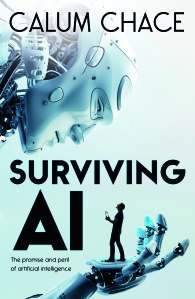 “Surviving AI”, a non-fiction review of the promise and peril of artificial intelligence, will be published later this summer. Designer Rachel Lawston has produced a terrific cover (biased? me?), and I’m very grateful to all the illustrious (and busy) people below who gave their time to review it:
“Surviving AI”, a non-fiction review of the promise and peril of artificial intelligence, will be published later this summer. Designer Rachel Lawston has produced a terrific cover (biased? me?), and I’m very grateful to all the illustrious (and busy) people below who gave their time to review it:
A sober and easy-to-read review of the risks and opportunities that humanity will face from AI.
Jaan Tallinn, co-founder Skype; co-founder CSER and FLI
Understanding AI – its promise and its dangers – is emerging as one of the great challenges of coming decades and this is an invaluable guide to anyone who’s interested, confused, excited or scared.
David Shukman, BBC Science Editor
As artificial intelligence drives the pace of automation ever faster, it is timely that we consider in detail how it might eventually make an even more profound change to our lives – how truly general AI might vastly exceed our capabilities in all areas of endeavour. The opportunities and challenges of this scenario are daunting for humanity to contemplate, let alone to manage in our best interests.
We have recently seen a surge in the volume of scholarly analysis of this topic; Chace impressively augments that with this high-quality, more general-audience discussion.
Aubrey de Grey – CSO, SENS Research Foundation, and former AI researcher
Calum Chace provides a clear, simple, stimulating summary of the key positions and ideas regarding the future of Artificial General Intelligence and its potential risks. For the newcomer who’s after a non-technical, even-handed intro to the various perspectives being bandied about regarding these very controversial issues, Chace’s book provides a great starting-point into the literature.
It’s rare to see a book about the potential End of the World that is fun to read without descending into sensationalism or crass oversimplification.
Ben Goertzel – Chairman, Novamente LLC
Calum Chace is a prescient messenger of the risks and rewards of artificial intelligence. In “Surviving AI” he has identified the most essential issues and developed them with insight and wit – so that the very framing of the questions aids our search for answers.
Chace’s sensible balance between AI’s promise and peril makes “Surviving AI” an excellent primer for anyone interested in what’s happening, how we got here, and where we are headed.
Kenneth Cukier, co-author of “Big Data: A Revolution that Transforms How We Work, Live and Think”
If you’re not thinking about AI, you’re not thinking. Every business must evaluate the disruptive potential of today’s AI capabilities; every policy maker should be planning for the combination of high productivity and radical disruption of employment; and every person should be aware that we’re pelting down a foggy road toward powerful and pervasive technologies.
“Surviving AI” combines an essential grounding in the state of the art with a survey of scenarios that will be discussed with equal vigor at cocktail parties and academic colloquia.
Chris Meyer, Author of Blur, It’s Alive, and Standing on the Sun.
The appearance of Calum Chace’s book is of some considerable personal satisfaction to me, because it signifies the fact that the level of social awareness of the rise of massively intelligent machines (that I call artilects – artificial intellects) has finally reached the “third phase”, which I call “mainstream”. (Phase zero = no awareness, phase one = intellectuals crying in the wilderness, phase two = action groups, phase three = mainstream, phase four = politics).
As one of the tiny handful of people in the 80s in phase one, it has been a lonely business, so with Chace’s book explaining what I call “the species dominance debate” to a mass audience, it is clear that humanity is now well into phase three. The down-to-earth clarity of Chace’s style will help take humanity into what could be a very violent, “Transcendence” movie-like, real-life, phase four.
If you want to survive this coming fourth phase in the next few decades and prepare for it, you cannot afford NOT to read Chace’s book.
Prof. Dr. Hugo de Garis, author of “The Artilect War”, former director of the Artificial Brain Lab, Xiamen University, China
Advances in AI are set to affect progress in all other areas in the coming decades. If this momentum leads to the achievement of strong AI within the century, then in the words of one field leader it would be “the biggest event in human history”. Now is therefore a perfect time for the thoughtful discussion of challenges and opportunities that Chace provides.
“Surviving AI” is an exceptionally clear, well-researched and balanced introduction to a complex and controversial topic, and is a compelling read to boot.
Seán Ó hÉigeartaigh, Executive Director, Cambridge Centre for the Study of Existential Risk
“Surviving AI” is well written, presenting pretty much all the basic facts and information without excessive speculation.
Randal Koene, founder, carboncopies.org
“Surviving AI” is an extremely clear, even-handed and up-to-date introduction to the debate on artificial intelligence and what it will mean for the future of humanity.
Dan Goldman, Lecturer, Intelligent Systems and Networks Group, Imperial College
A good overview of a lot of the issues surrounding potentially super-powered AI.
Dr Stuart Armstrong, Future of Humanity Institute
In “Surviving AI”, Calum Chace provides a marvellously accessible guide to the swirls of controversy that surround discussion of what is likely to be the single most important event in human history – the emergence of artificial superintelligence.
Throughout, “Surviving AI” remains clear and jargon-free, enabling newcomers to the subject to understand why many of today’s most prominent thinkers have felt compelled to speak out publicly about it.
David Wood – Chair, London Futurists
Artificial intelligence is the most important technology of our era. Technological unemployment could force us to adopt an entirely new economic structure, and the creation of superintelligence would be the biggest event in human history. “Surviving AI” is a first-class introduction to all of this.
Brad Feld, co-founder, Techstars
The promises and perils of machine superintelligence are much debated nowadays. But between the complex and sometimes esoteric writings of AI theorists and academics like Nick Bostrom, and the popular-press prognostications of Elon Musk, Bill Gates and Stephen Hawking, there is something of a gap. Calum Chace’s Surviving AI bridges that gap perfectly. It provides a compact yet rigorous guide to all the major arguments and issues in the field. An excellent resource for those who are new to this topic.
John Danaher, Institute for Ethics and Emerging Technologies (IEET)
Calum Chace strikes a note of clarity and balance in the important and often divisive dialogue around the benefits and potential dangers of artificial intelligence. It’s a debate we need to have, and Calum is an accessible and helpful guide.
Ben Medlock – cofounder, Swiftkey


July 7, 2015
Artificial intelligence and ethics
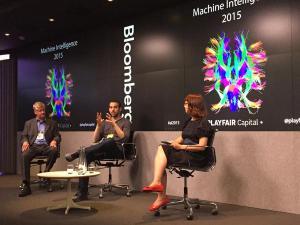 I recently debated some of the ethical considerations raised by the rapid development of artificial intelligence with Ben Medlock of Swiftkey. Sally Davies of the FT was the ringmaster, and the event was hosted by Playfair Capital. The video is now available:
I recently debated some of the ethical considerations raised by the rapid development of artificial intelligence with Ben Medlock of Swiftkey. Sally Davies of the FT was the ringmaster, and the event was hosted by Playfair Capital. The video is now available:


July 6, 2015
Professor Margaret Boden’s talk at the Centre for the Study of Existential Risks
 Professor Boden has been in the AI business long enough to have worked with John McCarthy and some of the other founders of the science of artificial intelligence. During her animated and compelling talk to a highly engaged audience at CSER in Cambridge last month, the sparkle in her eye betrayed the fun she still gets from it.
Professor Boden has been in the AI business long enough to have worked with John McCarthy and some of the other founders of the science of artificial intelligence. During her animated and compelling talk to a highly engaged audience at CSER in Cambridge last month, the sparkle in her eye betrayed the fun she still gets from it.
The main thrust of her talk was that those who believe that an artificial general intelligence (AGI) may be created within the next century are going to be disappointed. She was at pains to emphasise that the project is feasible in principle, but she offered a series of examples of things which AI systems cannot do today, which she is convinced they will remain unable to do for a very long time, and perhaps forever.
Professor Boden likes to laugh, and she likes to make other people laugh. Her first example concerned two blackberry pickers. One, a young man, can pick 30 pounds in a day, and the other, a young woman, can pick 20. If you ask an AI how many pounds they will pick on a joint trip to the hedgerows it will say 50. If you ask adult humans, they will give you a wry smile and reply that the number may well be considerably smaller.
Several members of the audience took issue with professor Boden’s assessment of the state of play in computer vision, arguing that Google’s and Facebook’s systems can now recognise animal faces from all angles, not just from the front as she said. But there was a more open debate about whether AI systems will be able to take relevance and context into account. She told the story of her young granddaughter, who delights in telling this joke: What do you call two robbers in an underwear shop? A pair of nickers. Her granddaughter enjoys the faux-appalled laugh this raises from adults, but she doesn’t understand it – and neither could an AI system. Some people in the audience were not convinced that she had proved her point, and a vigorous debate followed the talk.
Notwithstanding her scepticism about the prospects for near-term AGI, Professor Boden is pleased at the media coverage of the expressions of concern by Hawking, Musk, Gates and others. She thinks that AI will present us with significant challenges long before AGI, notably the possibility of automation leading to widespread technological unemployment. On that point there was widespread agreement.


June 25, 2015
Technological unemployment
 At an event to mark the launch of the FastFuture book, The Future of Business, I gave a short (8-minute) talk on the possibility that automation will create an economic singularity and lead to widespread technological unemployment.
At an event to mark the launch of the FastFuture book, The Future of Business, I gave a short (8-minute) talk on the possibility that automation will create an economic singularity and lead to widespread technological unemployment.
If that happens, will we be able to devise an economic system that can cope with some form of Universal Basic Income, and will we be able to get from here to there without social breakdown?
Afterwards, Martin Dinov, Computational and Experimental Neuroscience PhD Researcher at Imperial College, gave a commendably clear talk on artificial neural networks.
The video is here. (The sound quality is not brilliant, and for some reason you have to move cursor back to the start manually. Technology!)


June 19, 2015
Future Trends Forum
 Last week I was in Madrid, taking part in the 24th meeting of the Future Trends Forum, a think tank set up by BankInter, a leading Spanish bank.
Last week I was in Madrid, taking part in the 24th meeting of the Future Trends Forum, a think tank set up by BankInter, a leading Spanish bank.
The subject was the Second Machine Age – organising for prosperity, and this short video was shot during the meeting:
The jumping-off point for the meeting was the eponymous book by Erik Brynjolfsson and Andrew McAfee, so a lot of the discussion revolved around automation and the possibility of widespread technological unemployment.
The organisers brought together a fantastic group of smart, experienced people who worked together in a very open and collaborative way during the three days to frame and try to resolve the knotty issues raised by this subject. Our ringmaster was Chris Meyer, author of Standing on the Sun, and it was in no small part due to his great skill at the job that the event was thoroughly enjoyable as well as highly stimulating.
Great credit to BankInter, whose Foundation, run by Sergio Martinez-Cava, hosts these events, and also to Ludic, a design strategy consultancy which provided technical wizardry.
I’m really looking forward to the publication of the reports which the Foundation makes available following Forum meetings. The debate was consistently fascinating, and it addressed some of the most important challenges we face today.
For me, one of the most interesting and significant findings was that slightly more than 50% of the participants do not think that automation will result in technological unemployment, and that we will work with the machines to find more and more value-added jobs. I was in the dissenting minority.


June 1, 2015
New book: “Surviving AI”. Review copies available
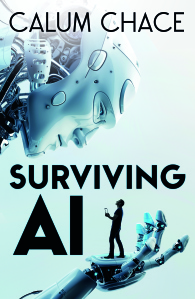 I’ve just finished writing a non-fiction book on artificial intelligence, called Surviving AI.
I’ve just finished writing a non-fiction book on artificial intelligence, called Surviving AI.
It starts with a brief history of the science and a description of its current state. It goes on to look at the benefits and risks that AI presents in the short and medium term, with a short story highlighting the improvements to everyday life that are in the pipeline, and discussions of technological unemployment and killer robots.
Then it gets into artificial general intelligence – machines with human-level cognition: whether we can create one, and if so when; whether we will like it if we do, and what we should do about it.
Surviving AI will be published this summer. If you would like a review copy in PDF or mobi for Kindles, email me at cccalum at gmail.com.


May 21, 2015
The Future of Business
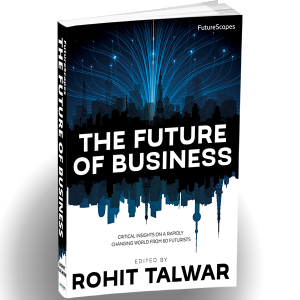 I’ve contributed a chapter to an interesting new book about the future of business.
I’ve contributed a chapter to an interesting new book about the future of business.
Edited by Rohit Talwar, The Future of Business looks at the social and economic forces, business trends, disruptive technologies, breakthrough developments in science and new ideas that will shape the commercial environment over the next two decades.
It contains chapters by 60 authors – established and emerging futurists from around the world – and is grouped into ten sections:
Visions of the Future – What are the global transformations on the horizon?
Tomorrow’s Global Order – What are the emerging political and economic transformations that could reshape the environment for society and business?
Emerging Societal Landscape – Who are we becoming, how will we live?
Social Technologies – How will tomorrow’s technologies permeate our everyday lives?
Disruptive Developments – How might new technologies enable business innovation?
Surviving and Thriving – How can business adapt to a rapidly changing reality? What are the critical success factors for business in a constantly evolving world?
Industry Futures – How might old industries change and what new ones could emerge?
Embracing the Future – What are the futures / foresight tools, methods and processes that we can use to explore, understand and create the future?
Framing the Future – Why and how should organisations look at the future?
Conclusions – Navigating uncertainty and a rapidly changing reality
To find out more please visit http://www.fastfuturepublishing.com
